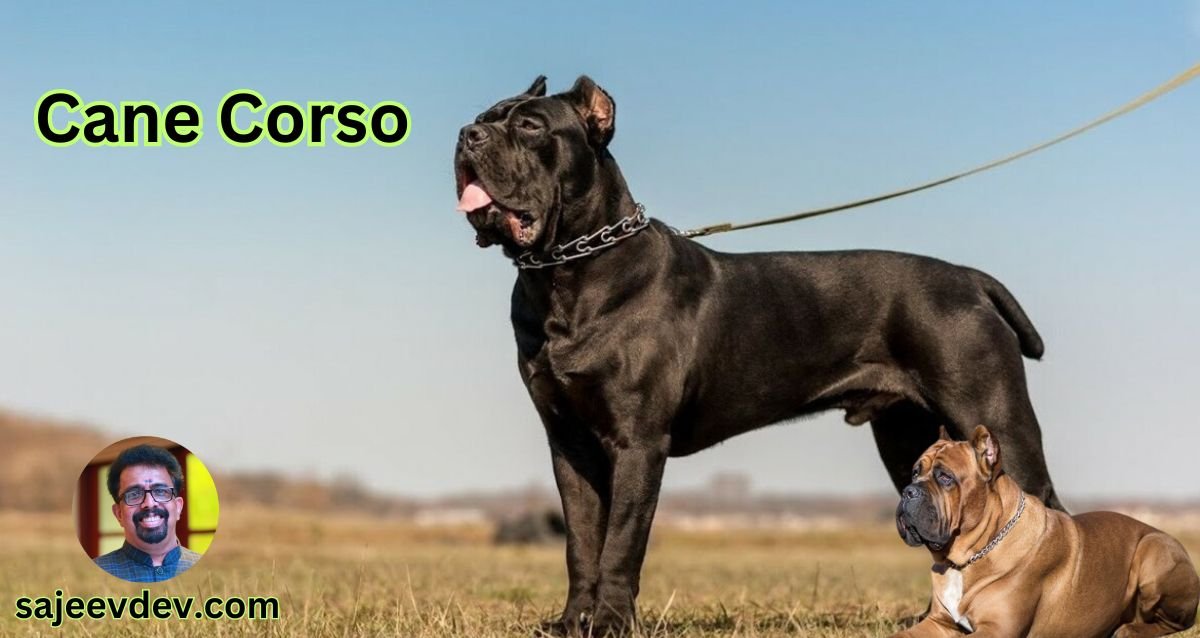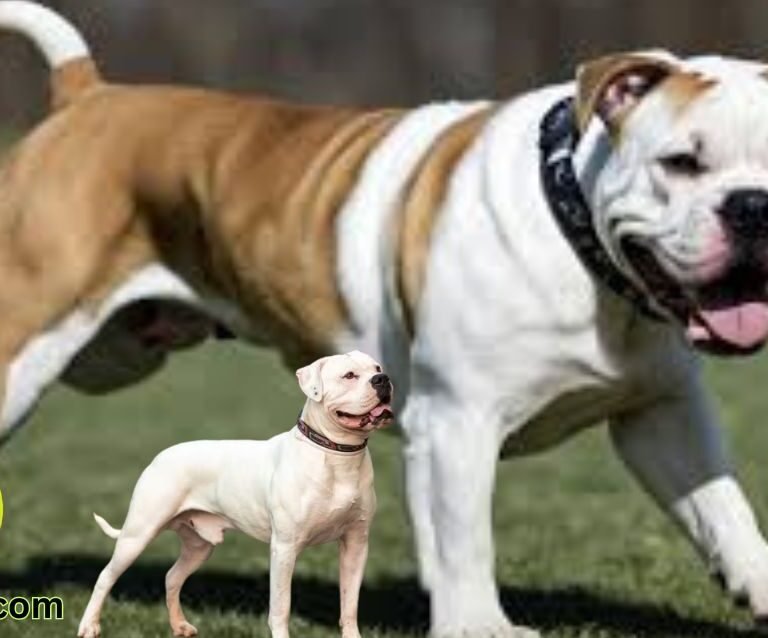Cane Corso
The Cane Corso is a large and powerful dog breed that hails from Italy, known for its historical significance and versatile roles throughout the ages. This breed’s origins can be traced back to ancient Roman times, where they were primarily used as hunting and guarding dogs. The Cane Corso possesses an impressive stature, with muscular build and strong features, which contribute to its reputation as a reliable protector and companion.
Today, the Cane Corso remains a prominent breed, cherished by dog enthusiasts around the world. Its popularity can be attributed to its remarkable blend of strength, intelligence, and loyalty. The breed is known for forming strong bonds with its owners and can exhibit a gentle disposition in a familial environment, contrasting its formidable appearance. Furthermore, the Cane Corso’s protective instincts make it an exceptional choice for families seeking a reliable guardian, as they are naturally inclined to defend their loved ones.
In the following sections, we will delve deeper into the Cane Corso’s origin, distinctive characteristics, and the level of danger associated with this impressive breed. Understanding these facets will enhance our appreciation for this noble dog and clarify the responsibilities of potential owners.
Historical Background of the Cane Corso
The Cane Corso, a distinguished breed originating from Italy, boasts a rich historical narrative that can be traced back to Roman times. This majestic dog is often recognized as a descendant of the ancient Roman war dogs, revered for their strength, loyalty, and courage. The name “Cane Corso” itself is derived from the Italian word “cane,” meaning “dog,” and “corso,” which is believed to reference their historical usage as a protector and guardian during warfare and in the households of Roman citizens.
Throughout its history, the Cane Corso has exemplified versatility, serving not only as a guardian of properties but also as a companion in farming and hunting endeavors. Early on, these dogs played crucial roles in herding livestock, guarding estates, and hunting larger game such as boars and deer. Their keen senses and formidable physique made them ideal candidates for these demanding tasks, and they became essential partners to the working class in rural Italian communities.
In contemporary times, the Cane Corso is celebrated not only for its historical legacy but also for its protective nature and loyalty to families. The breed has gained popularity across the globe, reflecting a growing appreciation for its robust physique, intelligence, and affectionate temperament. Understanding the historical background of the Cane Corso highlights its evolution and enduring significance in the collective cultural heritage of Italy, paving the way for its recognition as a valued member of the canine family.
Physical Characteristics of the Cane Corso
The Cane Corso is a strikingly large and formidable breed known for its muscular build and powerful stature. Recognized for their impressive structure, these dogs typically weigh between 90 to 120 pounds, with males generally being larger than females. Standing at a height of 24 to 28 inches, the Cane Corso presents an authoritative presence, which is both alarming and admirable. Their well-defined musculature gives them a robust appearance, easily conveying their strength and agility.
One of the defining features of the Cane Corso is its distinct head structure. They possess a broad, square-shaped head accompanied by a strong jawline that underscores their physical might. The face is adorned with expressive eyes that vary from amber to dark brown, revealing their intelligent and alert nature. Moreover, the breed’s ears can be cropped or left natural, with both options complementing their imposing visage. A cropped ear will enhance the breed’s aesthetic, giving it a more alert and fierce look, while natural ears contribute to a more gentle expression.
The coat of the Cane Corso is another notable characteristic. Their short, dense coat is weather-resistant and comes in a range of colors including black, fawn, gray, and brindle, providing potential owners with a variety of visual choices. The coat lies flat against the body, emphasizing their muscular build. Seasonal shedding may occur, necessitating regular grooming to manage loose hair and maintain the dog’s overall hygiene.
In terms of size variations, while most Cane Corsos adhere to the breed standards, some may fall outside the typical weight range due to genetics or lifestyle factors. Regardless, it is essential for owners to understand these physical traits, as they reflect the breed’s temperament and exercise needs. A properly cared-for Cane Corso can be a loyal companion and an impressive guardian.
Temperament and Behavior Traits
The Cane Corso is renowned for its loyalty, intelligence, and protective nature, distinguishing itself as an exemplary family companion. This breed is generally affectionate towards its family members, forming strong bonds that create a sense of security within the household. Cane Corsos are known to be highly trainable due to their intelligence, which makes them quick learners. However, this attribute can sometimes lead to stubbornness if not guided correctly. Their strong-willed nature demands a confident owner who can provide consistent training and clear boundaries.
One of the most striking characteristics of the Cane Corso is its protective instinct. The breed is naturally inclined to safeguard its family and territory, making it an excellent watchdog. This protectiveness can manifest itself in wariness towards strangers, and it is crucial for early socialization to ensure that the dog can appropriately distinguish between a true threat and friendly visitors. Without proper socialization and training, there is a risk that the Cane Corso may exhibit aggressive tendencies if it perceives a situation as a threat.
The Danger Level: Understanding Aggression in Cane Corso
The Cane Corso, a breed known for its robust build and protective instincts, has garnered a reputation for being a high-risk dog. This perception is primarily attributed to its aggressive tendencies, particularly towards strangers. Understanding the underlying reasons for this aggression is essential for prospective owners and dog enthusiasts alike. The Cane Corso is a natural guardian, bred historically to protect property and livestock. This protective nature, while a desirable trait in many contexts, can lead to mistrust or aggression if not appropriately managed.
One of the key factors contributing to the Cane Corso’s aggressive behavior is its strong territorial instincts. This breed has a tendency to view anything or anyone encroaching on its territory as a potential threat. In settings where the dog feels its home and family are at risk, it may respond with aggression, reflecting its instinctive role as a protector. Additionally, the Cane Corso is highly intelligent, which can be both a blessing and a challenge. If lacking proper training and socialization, a Cane Corso may develop a mindset that fosters aggression towards unfamiliar individuals or animals.
Moreover, owner behavior plays a pivotal role in shaping the demeanor of a Cane Corso. Responsible ownership, including socialization from a young age, consistent training, and establishing firm boundaries, is crucial. Engaging professional trainers who understand the breed’s characteristics can aid in mitigating aggressive tendencies. Because of the Cane Corso’s substantial physical strength, even minor lapses in control or training can result in dangerous situations. Hence, it is imperative that potential owners recognize the inherent risks associated with this breed and approach ownership with an informed and conscientious attitude.
The Importance of Training and Socialization
Proper training and early socialization are critical for the development and well-being of Cane Corsos. As a breed known for its strength and protective instincts, the Cane Corso requires consistent guidance to mitigate any aggressive tendencies that may arise. Training should begin at an early age and continue throughout the dog’s life, as it establishes boundaries and encourages appropriate behavior in various situations.
Effective training methods for Cane Corsos often include positive reinforcement techniques. This approach involves rewarding desired behaviors with treats, praise, or playtime, which animals respond to better than punishment-based strategies. For instance, when a Cane Corso performs a command correctly, immediate rewards help reinforce those behaviors, making them more likely to be repeated. Consistency is paramount, as each family member should apply the same commands and rules to avoid confusing the dog.
Socialization is equally important for Cane Corsos. Exposure to diverse environments, various types of people, and other animals at a young age helps develop their temperament and reduces the likelihood of fear-based aggression. Future interactions should include visits to parks, encounters with different pets, and participation in puppy classes. These experiences equip the Cane Corso with a broader understanding of social cues, which is essential for their adaptability in various situations.
The goal of training and socialization is to cultivate a confident, well-mannered Cane Corso. Comprehensive training and continuous social experiences will lead to a well-balanced dog that can cohabitate peacefully within the household and community, ultimately enhancing the bond between owner and pet. Establishing a strong foundation during these crucial developmental stages will ensure that Cane Corsos thrive in family environments, showcasing their loyalty and protective nature without undue aggression.
Health Considerations for Cane Corsos
The Cane Corso is a majestic breed known for its strength and loyalty, yet like all breeds, it is susceptible to specific health concerns. Among the most prevalent issues in Cane Corsos is hip dysplasia, a genetic condition where the hip joint does not fit into the hip socket properly. This malformation can lead to arthritis or joint pain, especially in older dogs. Potential owners are advised to consult with breeders regarding health clearances for both parents, which can reduce the risk of hip dysplasia in offspring.
Another health condition to be aware of is dilated cardiomyopathy (DCM). This is a heart condition that can affect the breed, leading to a decrease in heart function and potentially resulting in congestive heart failure. Regular veterinary check-ups are essential for early detection and management of heart conditions, including routine heart screenings as the dog ages.
Obesity is also a significant health concern within the Cane Corso breed. Given their tendency to become easily overweight, managing their diet and exercise is crucial for maintaining optimal health. Owners should provide a balanced diet tailored to the dog’s age, weight, and activity level. It is advisable to consult a veterinarian for recommendations on high-quality commercial dog food or home-cooked diets that meet their nutritional needs.
In addition to diet, incorporating a daily exercise routine is vital for Cane Corsos, who are energetic and athletic dogs. Regular physical activity helps maintain a healthy weight and supports overall physical and mental well-being. Activities such as long walks, play sessions, and structured training can help satisfy their need for both physical and mental stimulation. By addressing these health considerations, owners can significantly promote the well-being and longevity of their Cane Corso.
Cane Corso as a Family Pet
The Cane Corso is a breed that combines loyalty, intelligence, and protective instincts, making it an exceptional choice for families. Historically bred as a guardian and hunting companion, these dogs possess a natural inclination to protect their home and loved ones. Their formidable presence may deter potential intruders, providing families with added security. However, this protective nature necessitates a well-structured environment to ensure that the Cane Corso understands its role within the family unit.
Families considering adopting a Cane Corso should be prepared for a committed relationship that requires socialization, training, and ongoing engagement. Early socialization is critical; introducing the dog to various people, environments, and experiences will help it develop into a well-adjusted family pet. These dogs thrive when provided with clear expectations, which facilitates better communication between the canine and family members. Adopting a consistent training regime is essential to help the Cane Corso learn appropriate behaviors and commands, solidifying its position as a valuable family member.
Cane Corsos are known for their affectionate nature, particularly towards their families. They often form strong bonds with all family members, including children. However, it is vital for children to understand how to interact with the dog appropriately. Teaching them to respect the dog’s space and recognizing the signs of overstimulation can foster a harmonious environment. Moreover, supervision during playtime is crucial to prevent any unintended aggressive behavior or overly boisterous interactions that may arise from a dog that is still learning its strength.
In conclusion, with proper training, socialization, and an established structure at home, the Cane Corso can thrive as a loyal and protective family companion, enriching the lives of those who welcome this dog into their household.
The Cane Corso is a breed steeped in history and heritage, known for its noble beginnings as a guardian and working dog
The Cane Corso is a breed steeped in history and heritage, known for its noble beginnings as a guardian and working dog. Understanding the Cane Corso’s origins offers insight into its strong protective instincts and loyalty, traits that can be both an asset and a challenge for potential owners. As discussed, these dogs require consistent training and socialization from a young age to ensure they develop into well-rounded companions. Their impressive strength and size often demand dedicated and experienced handlers who are prepared for the responsibility of managing such a potent breed.
Additionally, the Cane Corso is often characterized by its intelligence, devotion, and energy levels. Owners need to be prepared to engage in regular exercise and mental stimulation to keep this breed satisfied and healthy. It’s essential to recognize that a Cane Corso can become easily bored, leading to destructive behaviors if not provided with sufficient outlets for their energy. This breed thrives in an environment where it can work and play, fulfilling its natural instincts.
Before committing to a Cane Corso, consider your lifestyle, living situation, and the time you can dedicate to training and socialization. These dogs may not be the best choice for first-time dog owners or those with busy, unpredictable schedules. Assessing your experience with dogs, especially larger breeds, will help determine if you are equipped to handle a Cane Corso’s potential for aggression, along with its significant physical and emotional needs.
Ultimately, the decision to welcome a Cane Corso into your home should be made with careful consideration and readiness to embrace the challenges associated with this remarkable breed. Should you decide to proceed, a well-trained Cane Corso can be a loyal and loving family member, offering protection and companionship in equal measure.







